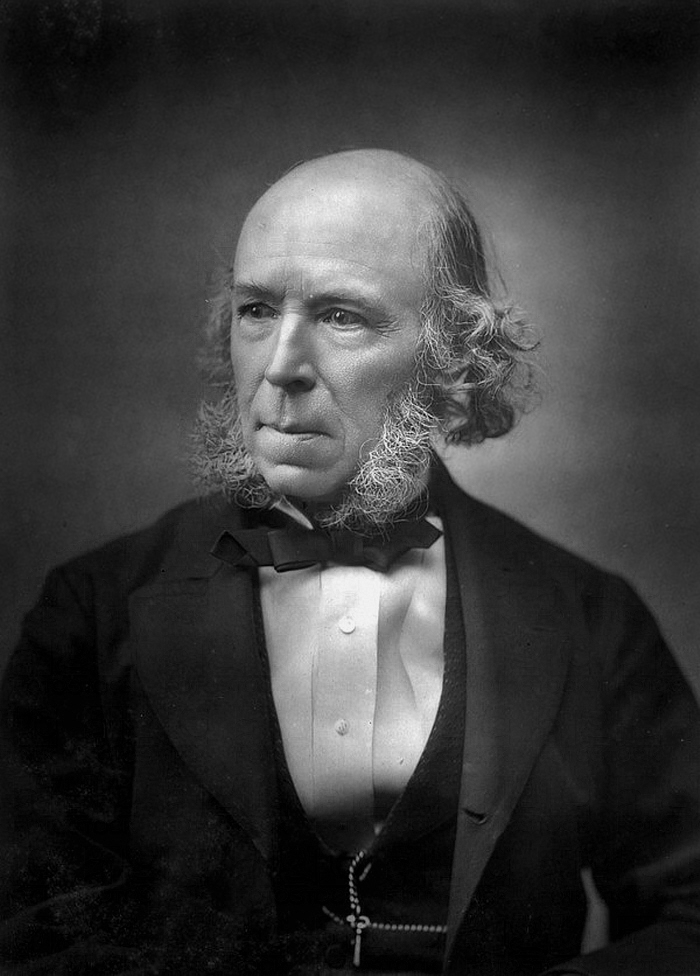Herbert Spencer Frases famosas
“A maioria das nossas satisfações vêm de fontes inesperadas”
most of my pleasures have come from unexpected sources
Essays: scientific, political, and speculative, Volume 2 - Página 50 http://books.google.com.br/books?id=DaYIAAAAQAAJ&pg=PA50, Herbert Spencer - Williams and Norgate, 1868
Herbert Spencer frases e citações
“Casamento: cerimônia em que se coloca uma aliança no dedo da mulher e outra no nariz do homem.”
Marriage: A ceremony in which rings are put on the finger of the lady and through the nose of the gentleman
citado em "Reader's digest service", Volume 35 - Página 65, De Witt Wallace, Lila Acheson Wallace, Lila Bell Wallace - The Reader's Digest Association, 1939
“Ciência é o conhecimento organizado.”
Herbert Spencer, filósofo inglês, conforme encontrado em Singh, Simon - Big Bang - Capítulo: "O que é ciência?" - Editora Record - 2006 - pág.: 459
Atribuídas
The Republican form of government is the highest form of government; but because of this it requires the highest type of human nature — a type nowhere at present existing.
Herbert Spencer on the Americans and the Americans on Herbert Spencer ... - Página 18, Herbert Spencer - 1883
Herbert Spencer: Frases em inglês
The Development Hypothesis (1852)
Pt. I, The Unknowable; Ch. IV, The Relativity of All Knowledge
First Principles (1862)
“Originally, ethics has no existence apart from religion, which holds it in solution.”
Fonte: The Principles of Ethics (1897), Part II: The Inductions of Ethics, Ch. 1, The Confusion of Ethical Thought
Ethics (New York:1915), § 72, pp. 193-194
The Principles of Ethics (1897), Part I: The Data of Ethics
Ethics (New York:1915), § 68, p. 187
The Principles of Ethics (1897), Part I: The Data of Ethics
Vol. 3, Ch. VII, Over-Legislation
Essays: Scientific, Political, and Speculative (1891)
Pt. II, The Knowable; Ch. XV, The Law of Evolution (continued)
First Principles (1862)
“Evil perpetually tends to disappear.”
Part I, Ch. 2 : The Evanescence of Evil, § 2
Social Statics (1851)
On the Origin and Function of Music
Essays on Education (1861)
Commonly attributed to Spencer, information provided in The Quote Verifier: Who Said What, Where, and When (2006) by Ralph Keyes and The Survival of a Fitting Quotation. (2005) by Michael StGeorge http://anonpress.org/spencer/, indicates the attribution may have originated with the book [w:The_Big_Book_(Alcoholics_Anonymous)|Alcoholics Anonymous]]. It was used exactly as written above in the personal stories section of the first edition in 1939 and in 'Appendix II: Spiritual Experience' of all subsequent editions.
: "Contempt prior to examination" was a phrase used by William Paley, the 18th-century English Christian apologist. In A View of the Evidences of Christianity (1794), he wrote:
::The infidelity of the Gentile world, and that more especially of men of rank and learning in it, is resolved into a principle which, in my judgment, will account for the inefficacy of any argument, or any evidence whatever, viz. contempt prior to examination.
:Paley's characterization of non-believers was later modified and used by other religious authors who uniformly attributed their words to Paley. In Anglo-Israel or, The British Nation: The lost Tribes of Israel (1879), Rev. William H. Poole may have been the first to render the quotation in its more familiar and enduring form:
::There is a principle which is a bar against all information, which is proof against all argument, and which cannot fail to keep a man in everlasting ignorance. This principle is, contempt prior to examination.
:Various authors following Rev. Poole would offer new iterations of the quotation into the early decades of the 20th century. Most of these credited William Paley, but by the early 1930s the first obscure publications to falsely attribute this quote to Spencer emerged. Its usage for decades since as a maxim in Alcoholics Anonymous and the twelve-step recovery community has popularized its erroneous association with Herbert Spencer.
Misattributed
Spencer here references William Benjamin Carpenter, Principles of Comparative Physiology http://books.google.com/books?id=ovgEAAAAYAAJ& see p. 473
The Development Hypothesis (1852)
Pt. I, sec. 6, "The Effect of Poetry Explained"
The Philosophy of Style (1852)
“Volumes might be written upon the impiety of the pious.”
Pt. I, The Unknowable; Ch. V, The Reconciliation
First Principles (1862)
The Development Hypothesis (1852)
Pt. I, The Unknowable; Ch. I, Religion and Science
First Principles (1862)
“Every cause produces more than one effect.”
On Progress: Its Law and Cause
Essays on Education (1861)
“With a higher moral nature will come a restriction on the multiplication of the inferior.”
The Principles of Biology, Vol. II (1867), Part VI: Laws of Multiplication, ch. 8: Human Population in the Future
Principles of Biology (1864)
They can show that in successive generations these changes continue; until, ultimately, the new conditions become the natural ones. They can show that in cultivated plants, in domesticated animals, and in the several races of men, such alterations have taken place. They can show that the degrees of difference so produced are often, as in dogs, greater than those on which distinctions of species are in other cases founded.
The Development Hypothesis (1852)
Thus writes Blackstone, to whom let all honour be given for having so far outseen the ideas of his time; and, indeed, we may say of our time. A good antidote, this, for those political superstitions which so widely prevail. A good check upon that sentiment of power-worship which still misleads us by magnifying the prerogatives of constitutional governments as it once did those of monarchs. Let men learn that a legislature is not “our God upon earth,” though, by the authority they ascribe to it, and the things they expect from it, they would seem to think it is. Let them learn rather that it is an institution serving a purely temporary purpose, whose power, when not stolen, is at the best borrowed.
Pt. III, Ch. 19 : The Right to Ignore the State, § 2
Social Statics (1851)
